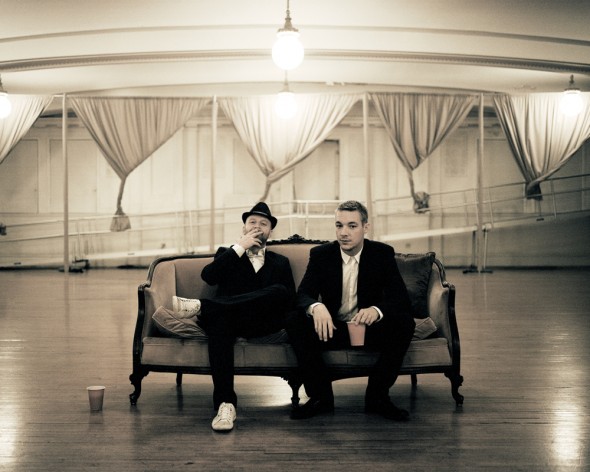
Photography Aeschleah Demartino
The influence of classic Jamaican reggae and dub music on contemporary house, electronic and hip hop production is a topic that often slips under the radar of, well, most people. Some would say a groundbreaking moment occurred in the late ‘60s, when legendary Kingston reggae sound engineer King Tubby began to experiment with what a mixing board was capable of creating by manipulating an existing piece of recorded music. From that moment on, the role of the music producer was fundamentally changed, and Tubby created what is most commonly referred to today as the “remix.”
House/electro luminaries and genre-bending producers Diplo and Switch know full well where the roots of the music lie. Their recent collaboration (or rather reincarnation) as Major Lazer, an animated Jamaican commando and vampire destroyer with a prosthetic laser gun attached to one arm (a replacement for the partial limb he lost in the secret Zombie Wars of 1984), is an inspired interpretation of those roots. Diplo, the American half of the duo, says, “I think a lot of those guys in the early stages of Dub created what we have as producers and musicians. Before that, there were just guys saying, ‘Let’s try another guitar,’ but then there were guys that realized when you twist one knob it becomes everything else. That’s what we do. It is like making music in the box.”
It was these connections that led the two producers to focus on Jamaica for their first full-length album. Switch explains, “That was one of the reasons why we thought the album would work…the music of Jamaica has been such an influence on what we do, but I guess it comes out a little bit more subtly. What we wanted to do was go and kind of take what we like from Jamaica and then put our stamp on it.”
The debut album, Guns Don’t Kill People… Lazers Do, runs the gamut of production styles, from a classically styled, one-drop, roots reggae track, “Cash Flow,” featuring Guyanese vocalist Jah Dan (one of two songs on the album that most listeners would associate with the genre), to the dance floor-packing, “Hold the line,” the album’s first single, voiced by veteran dancehall DJ Lexxus and Santigold (who worked with Diplo on her reggae/dancehall mixtape, Top Ranking: A Diplo Dub).
Both of the creative minds behind Major Lazer are quick to acknowledge the historical implications in the creation of this project. When asked how long Guns Don’t Kill People…has been in the works, Diplo says, “I guess since 1984.” Switch adds, “Yeah, pass the dutchie pon the left hand side,” referencing the perennial reggae tune released two years prior. However, careful not to overlook the contemporary nature of the collaboration, Diplo follows up by quickly saying, “It’s never going to end.” Switch laughs and affirms, “For as long as Jamaica exists.”
The visual aspects of the project were crafted by London-based artist Ferry Gouw to portray the persona of the album’s protagonist, Major Lazer. Gouw’s animations and illustrations, inspired both by the fictional world rife with zombies and vampires that Major Lazer inhabits, and album artwork from past Jamaican studio releases, have garnered almost as much attention as the music itself. Together, the two components bring something to the table that fans rarely get to enjoy—a fully developed concept presented through both sight and sound.
Major Lazer may be Diplo and Switch’s illustrated nod to the foundation laid by pioneering reggae sound engineers of decades past, but the album certainly does not play like a rehash of Bob Marley songs, and is not a bandwagon attempt to recreate what is popular in Jamaican music today. Guns Don’t Kill People…is loaded primarily with mind blowing dance tracks voiced by reggae/dancehall front runners that both capture the essence of current Caribbean tunes and push them so far out into the galaxy that, in some cases, the only thing that one might associate with Jamaica is the speech patterns of the artists.
Armed with an arsenal of unreleased material, plans for future mixtapes, and several highly anticipated international tour dates set for summer and fall, one can expect to hear much more from Major Lazer in the coming months. Diplo says, “You know, it’s not trendy or anything, but we’re doing it because we think this shit is important. It’s music that we appreciate, so we’re gonna keep doing different things and having different ideas and try to change things up.” A healthy outlook, considering that changing things up is exactly how it all started, 40 years ago, in Kingston, Jamaica.
– Omar Almufti

